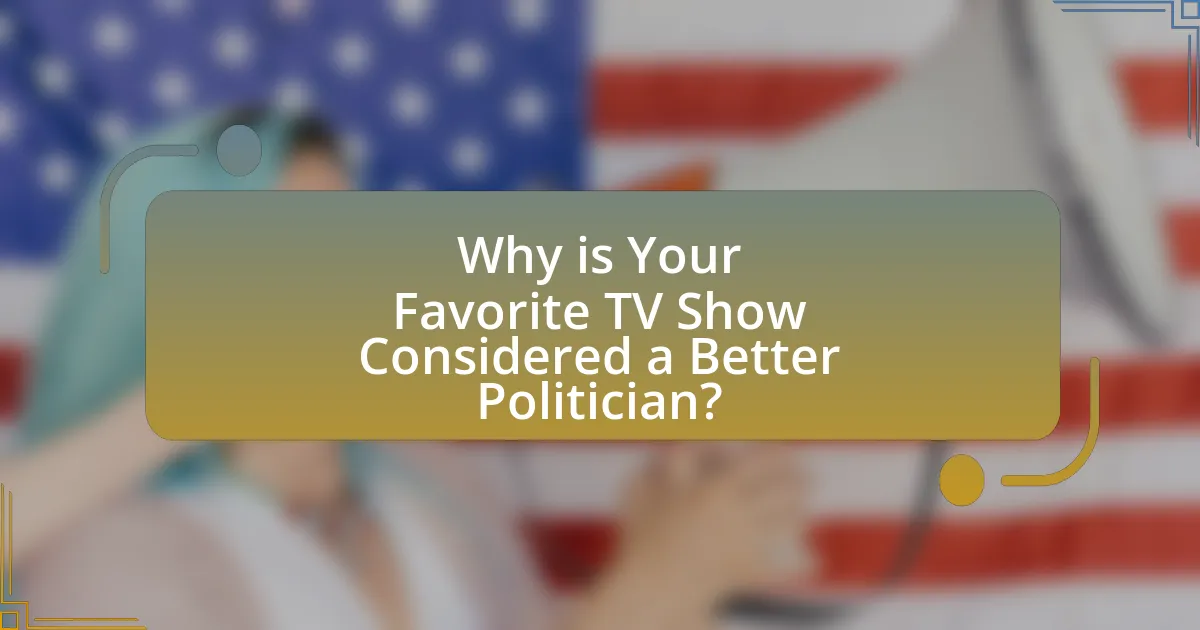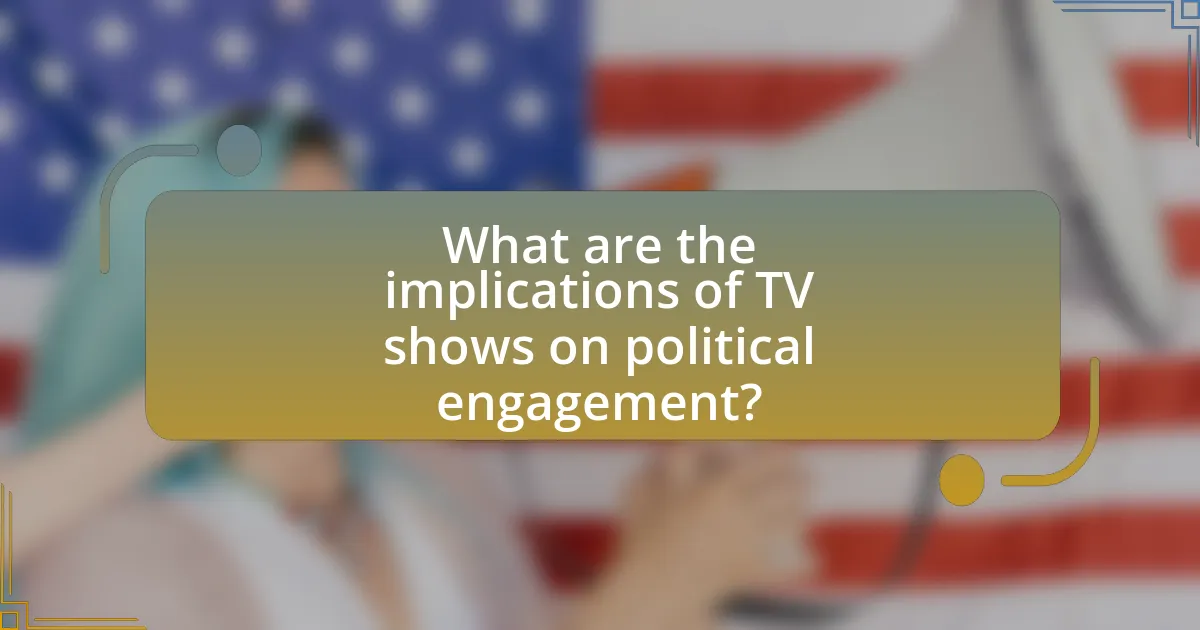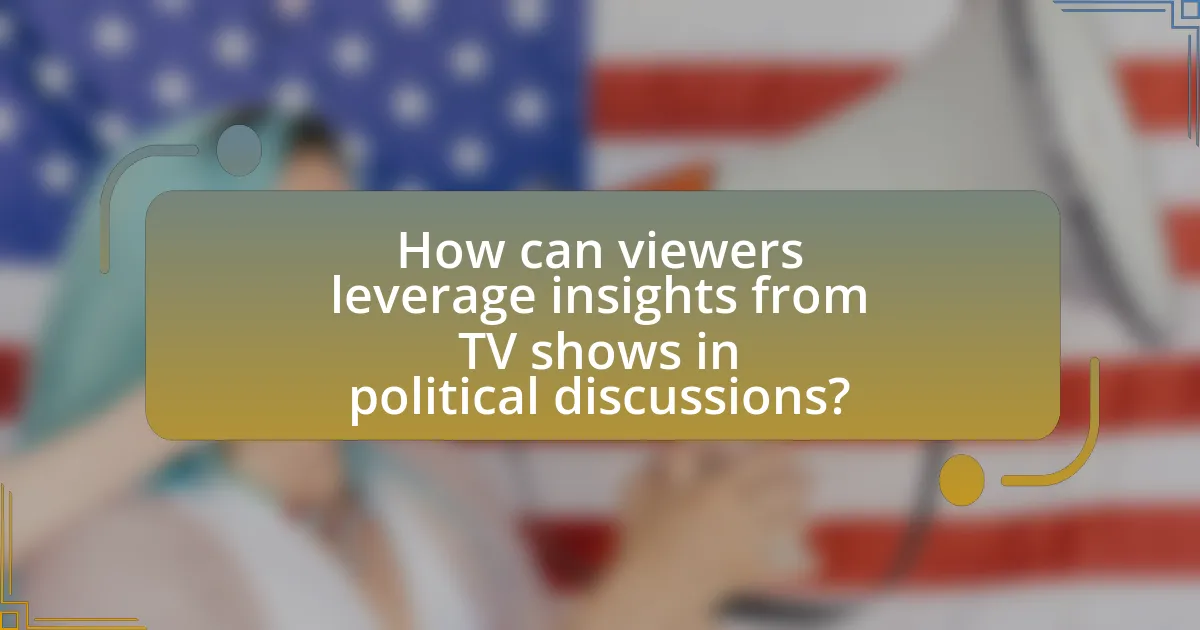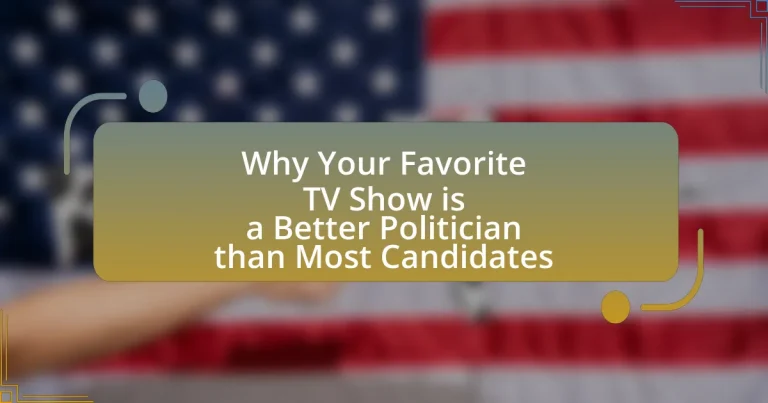The article examines the premise that popular TV shows often serve as more effective politicians than actual candidates by engaging audiences with relatable narratives and complex social issues. It highlights how shows like “The West Wing” and “The Daily Show” foster political awareness, civic participation, and critical thinking among viewers. Key aspects discussed include the emotional engagement of characters, the simplification of political issues, and the influence of storytelling on public perception and voter behavior. Additionally, the article explores how humor and satire shape political discourse and the implications of TV narratives on real-world political actions and engagement.

Why is Your Favorite TV Show Considered a Better Politician?
Your favorite TV show is considered a better politician because it often presents complex social issues and moral dilemmas in a relatable manner, fostering critical thinking among viewers. For instance, shows like “The West Wing” depict political processes and ethical governance, encouraging audiences to engage with real-world political discourse. This engagement is supported by studies indicating that political dramas can increase viewers’ political knowledge and civic participation, as evidenced by research from the American Political Science Review, which found that viewers of political shows are more likely to vote and discuss political issues.
What qualities make a TV show more politically effective than real candidates?
A TV show can be more politically effective than real candidates due to its ability to engage audiences emotionally, simplify complex issues, and create relatable narratives. Engaging storytelling captivates viewers, fostering a deeper connection to political themes compared to the often dry presentations of real candidates. Simplification of complex political issues allows audiences to grasp essential points quickly, as seen in shows like “The West Wing,” which distills intricate political processes into digestible storylines. Additionally, relatable characters can embody diverse perspectives, making political discourse more accessible and resonant, as evidenced by the popularity of shows that tackle social issues through character-driven plots. These qualities enable TV shows to influence public opinion and political engagement more effectively than traditional candidates.
How do character development and storytelling influence political perception?
Character development and storytelling significantly influence political perception by shaping viewers’ emotional connections and moral frameworks regarding political figures. Well-developed characters in narratives often embody traits that resonate with audiences, such as integrity, empathy, or resilience, which can lead viewers to project these qualities onto real-life politicians. For instance, characters like President Josiah Bartlet from “The West Wing” exemplify ideal leadership, influencing public expectations of political behavior and ethics. Research indicates that storytelling can enhance engagement and retention of political information, making complex issues more relatable and understandable, thereby affecting how individuals perceive political realities. This connection between narrative and perception is supported by studies showing that individuals who engage with political narratives are more likely to develop informed opinions and civic engagement, as evidenced by the work of scholars like Melanie Green and Timothy Brock, who explored the impact of narrative transportation on belief change.
What role does audience engagement play in a show’s political effectiveness?
Audience engagement significantly enhances a show’s political effectiveness by fostering a deeper connection between the content and its viewers. Engaged audiences are more likely to absorb and reflect on political messages presented in the show, leading to increased awareness and potential shifts in public opinion. For instance, studies have shown that programs like “The Daily Show” and “Saturday Night Live” effectively mobilize viewers to participate in political discourse and even voting, as evidenced by a 2018 study published in the Journal of Broadcasting & Electronic Media, which found that comedic political content can increase political knowledge and engagement among younger audiences. This demonstrates that when viewers actively engage with a show’s narrative and characters, they are more inclined to consider and act upon the political themes being explored.
In what ways do TV shows address political issues?
TV shows address political issues through satire, dramatization, and character-driven narratives that reflect real-world events and societal concerns. For instance, series like “The West Wing” portray the inner workings of government and political decision-making, while shows like “Veep” use humor to critique political behavior and ethics. Additionally, programs such as “The Handmaid’s Tale” highlight issues like women’s rights and authoritarianism, drawing parallels to contemporary political climates. These representations can influence public opinion and spark discussions about governance, policy, and civic responsibility, demonstrating the power of television as a medium for political discourse.
How do plotlines reflect real-world political scenarios?
Plotlines reflect real-world political scenarios by mirroring contemporary issues, power dynamics, and societal conflicts. For instance, shows like “House of Cards” depict the ruthless nature of political ambition and manipulation, paralleling real-life political scandals and the ethical dilemmas faced by leaders. Additionally, series such as “The West Wing” highlight the complexities of governance and public policy, showcasing how fictional characters navigate challenges that resonate with actual political events, such as legislative battles and crisis management. These narratives often draw from historical events, such as Watergate or the civil rights movement, providing viewers with a lens through which to understand and critique real-world politics.
What messages about governance and leadership are conveyed through popular shows?
Popular shows convey messages about governance and leadership by illustrating the complexities of power dynamics, ethical dilemmas, and the impact of decision-making on society. For instance, series like “House of Cards” depict the ruthless nature of political ambition, highlighting how personal ethics can be compromised for power. Similarly, “The West Wing” portrays idealistic leadership, emphasizing collaboration and moral responsibility in governance. These narratives reflect real-world political challenges, demonstrating that effective leadership requires not only strategic thinking but also empathy and integrity. Such portrayals resonate with audiences, shaping their perceptions of what constitutes effective governance and the qualities of a good leader.
How do TV shows create relatable political figures?
TV shows create relatable political figures by developing characters with human flaws, relatable motivations, and complex backgrounds that mirror real-life experiences. These characters often face moral dilemmas, personal struggles, and societal challenges, making them more accessible to viewers. For instance, shows like “The West Wing” and “Parks and Recreation” depict politicians who grapple with personal and professional issues, allowing audiences to see them as multidimensional individuals rather than just political archetypes. This approach fosters empathy and connection, as viewers can identify with the characters’ journeys and decisions, reflecting their own lives and values.
What traits of fictional characters resonate with viewers compared to real politicians?
Fictional characters often resonate with viewers due to their relatability, moral clarity, and emotional depth, traits that are frequently lacking in real politicians. Viewers connect with characters who demonstrate integrity and a clear sense of purpose, as seen in shows like “The West Wing,” where characters embody idealism and dedication to public service. In contrast, real politicians may struggle with public trust and perceived self-interest, leading to disillusionment among constituents. Studies indicate that audiences prefer narratives where characters face moral dilemmas and exhibit growth, reflecting a desire for authenticity and accountability that is often absent in political discourse.
How does humor and satire in TV shows shape political discourse?
Humor and satire in TV shows significantly shape political discourse by providing a platform for critique and reflection on political issues. These shows often simplify complex political topics, making them more accessible to a broader audience, which can lead to increased political awareness and engagement. For instance, programs like “The Daily Show” and “Saturday Night Live” have historically influenced public opinion by highlighting political absurdities and inconsistencies, as evidenced by their impact on voter perceptions during elections. Research indicates that viewers of satirical content are more likely to discuss political issues and participate in civic activities, demonstrating that humor can effectively mobilize audiences and foster critical thinking about political matters.

What are the implications of TV shows on political engagement?
TV shows significantly influence political engagement by shaping public perceptions and encouraging civic participation. Research indicates that programs with political themes can increase viewers’ awareness of political issues and motivate them to vote; for instance, a study published in the Journal of Communication found that exposure to political content in entertainment media correlates with higher voter turnout among young audiences. Additionally, TV shows often humanize political figures and issues, making them more relatable and accessible, which can lead to increased public discourse and activism.
How do TV shows influence public opinion and voter behavior?
TV shows influence public opinion and voter behavior by shaping perceptions, attitudes, and beliefs through storytelling and character representation. Research indicates that characters in popular series can humanize political issues, making them more relatable and understandable to viewers. For instance, a study published in the Journal of Communication found that exposure to political narratives in TV shows can lead to increased political engagement and a greater likelihood of voting, particularly among younger audiences. Additionally, shows that depict political figures or issues can sway viewers’ opinions by framing them in a specific light, as evidenced by the impact of series like “The West Wing” on public perceptions of political processes and leadership.
What evidence exists linking TV show narratives to real-world political actions?
Evidence linking TV show narratives to real-world political actions includes studies showing that popular series can influence public opinion and political engagement. For instance, a study published in the Journal of Communication found that viewers of political dramas like “The West Wing” reported increased political interest and knowledge, suggesting that narrative storytelling can shape perceptions of political processes. Additionally, research by the American Psychological Association indicates that characters in shows can serve as role models, prompting viewers to engage in civic activities, such as voting or activism, based on the behaviors they observe. These findings demonstrate a clear connection between the narratives presented in television shows and tangible political actions taken by audiences.
How do fandoms mobilize for political causes inspired by their favorite shows?
Fandoms mobilize for political causes inspired by their favorite shows through organized campaigns, social media activism, and community engagement. For instance, fans of shows like “The Handmaid’s Tale” have utilized social media platforms to raise awareness about women’s rights and reproductive health issues, often organizing protests and advocacy events that echo themes from the series. Research indicates that fandoms can effectively leverage their collective identity and passion to influence public opinion and policy, as seen in the “Save Our Shows” campaigns that have successfully lobbied for the continuation of series that address social justice issues. These actions demonstrate the power of fandoms to translate entertainment narratives into real-world political activism.
What lessons can politicians learn from successful TV shows?
Politicians can learn the importance of storytelling and character development from successful TV shows. Engaging narratives and well-defined characters resonate with audiences, making complex issues more relatable. For instance, shows like “The West Wing” effectively humanize political processes, demonstrating how emotional connections can influence public perception and support. Additionally, successful TV shows often utilize cliffhangers and suspense to maintain viewer interest, a strategy that politicians can adopt to keep their constituents engaged and invested in ongoing campaigns or policies. This approach is supported by research indicating that emotional storytelling enhances message retention and persuasion, as seen in studies published in the Journal of Communication.
How can storytelling techniques improve political campaigns?
Storytelling techniques can improve political campaigns by creating emotional connections with voters, making messages more relatable and memorable. When candidates use narratives that resonate with the experiences and values of their audience, they can effectively engage and persuade constituents. Research indicates that stories can enhance information retention by up to 22 times compared to facts alone, as demonstrated in a study published in the journal “Psychological Science.” This ability to evoke emotions and foster empathy allows candidates to differentiate themselves and build trust, ultimately leading to increased voter support.
What strategies from TV shows can enhance candidate relatability?
Strategies from TV shows that can enhance candidate relatability include character development, humor, and storytelling. Character development allows viewers to connect with characters on a personal level, making candidates appear more human and approachable. Humor can break down barriers and create a sense of camaraderie, as seen in shows like “Parks and Recreation,” where the light-hearted approach fosters a relatable image. Storytelling, exemplified in series like “The West Wing,” helps candidates convey their values and experiences in a compelling way, making them more memorable and relatable to the audience. These strategies effectively bridge the gap between candidates and voters, fostering a sense of connection and trust.

How can viewers leverage insights from TV shows in political discussions?
Viewers can leverage insights from TV shows in political discussions by analyzing character motivations and plot developments that reflect real-world political dynamics. For instance, shows like “The West Wing” and “House of Cards” illustrate the complexities of political decision-making and the impact of public opinion, which can inform viewers’ understanding of current political events. By discussing these narratives, viewers can draw parallels to actual political scenarios, enhancing their ability to articulate opinions and engage in informed debates. This approach is supported by research indicating that narrative storytelling in media can shape public perception and political attitudes, as demonstrated in studies published in the Journal of Communication.
What critical thinking skills can be developed through analyzing TV shows?
Analyzing TV shows can develop critical thinking skills such as analytical reasoning, interpretation of complex narratives, and evaluation of character motivations. Analytical reasoning is enhanced as viewers dissect plotlines and character decisions, allowing them to identify underlying themes and societal issues. Interpretation of complex narratives fosters the ability to understand multiple perspectives and the implications of various story arcs. Evaluating character motivations encourages viewers to assess ethical dilemmas and the consequences of actions, which is crucial for informed decision-making. These skills are vital in understanding real-world political dynamics, as they mirror the complexities found in political discourse and decision-making processes.
How can viewers differentiate between entertainment and political reality?
Viewers can differentiate between entertainment and political reality by critically analyzing the intent, context, and presentation of the content. Entertainment often aims to engage and amuse, using dramatization and fictional narratives, while political reality focuses on factual information, policy discussions, and real-world implications. For instance, political news programs provide analysis based on verified sources and current events, whereas scripted shows may exaggerate scenarios for comedic or dramatic effect. Recognizing these distinctions helps viewers discern between the two realms effectively.
What discussions can arise from comparing fictional and real political scenarios?
Comparing fictional and real political scenarios can lead to discussions about the effectiveness of political narratives, the portrayal of leadership qualities, and the impact of public perception on political behavior. These discussions often highlight how fictional characters can embody idealized traits such as integrity and decisiveness, which may contrast sharply with the complexities and shortcomings of real-world politicians. For instance, characters like President Josiah Bartlet from “The West Wing” exemplify moral clarity and effective governance, prompting debates about the expectations society has for real leaders. Additionally, analyzing the consequences of fictional political decisions can provide insights into public policy and ethical dilemmas faced in reality, fostering a deeper understanding of political dynamics and voter engagement.
What practical tips can enhance political discussions inspired by TV shows?
To enhance political discussions inspired by TV shows, participants should focus on specific themes and character motivations presented in the shows. Engaging with the narrative allows for deeper analysis of political issues, as many TV shows reflect real-world political dynamics. For instance, discussing the ethical dilemmas faced by characters can lead to conversations about moral decision-making in politics. Additionally, using quotes or scenarios from the shows can provide concrete examples that illustrate complex political concepts, making discussions more relatable and grounded. Research indicates that narrative transportation, where viewers become emotionally involved in a story, can increase empathy and understanding of diverse perspectives, thus enriching political dialogue.
How can viewers use examples from shows to articulate their political views?
Viewers can use examples from shows to articulate their political views by drawing parallels between the narratives and characters in the shows and real-world political issues. For instance, a character’s struggle against systemic injustice can serve as a reference point for discussing social justice movements, allowing viewers to express their beliefs and opinions on similar real-life situations. Research indicates that media representations can shape public perception and discourse, as demonstrated by studies showing that exposure to political themes in television influences viewers’ attitudes and engagement with political issues. This connection between fictional narratives and real-world politics enables viewers to articulate their views more effectively by providing relatable examples and context.
What resources can help deepen understanding of political themes in TV shows?
Books, articles, and academic journals focusing on media studies and political science can deepen understanding of political themes in TV shows. For instance, “The Politics of Television” by David M. Levy explores how television reflects and shapes political discourse. Additionally, scholarly articles such as “Television and Politics: A Critical Review” published in the Journal of Communication provide insights into the relationship between media and political narratives. These resources offer critical analyses and frameworks that help viewers interpret the political implications embedded in television narratives.


